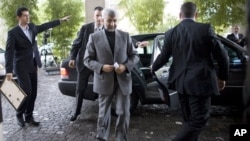Does the willingness of Iran to talk for the first time in over a year with the five permanent members of the UN Security Council plus Germany, the P5 + 1, have anything to do with the tough sanctions imposed on Iran over its nuclear program?
U.S. Undersecretary of State for Political Affairs William Burns says the U.S. and its partners have repeatedly emphasized that what is at issue is not Iran's right to a peaceful nuclear program:
"But rather its decades-long failure to live up to the responsibilities that come with that right. If Iran is sincere, it should not be hard to show the rest of the international community that its nuclear program is aimed at exclusively peaceful purposes."
On December 6 and 7th, Iranian representatives met in Geneva with the P5+1 and agreed to do so again in January in Istanbul. The Geneva talks took place six months after the UN Security Council adopted new sanctions on Iran, and individual countries followed with additional penalties of their own.
Treasury Undersecretary for Terrorism and Financial Intelligence Stuart Levey described the desired effect of sanctions on the decision-making calculus of the Iranian leadership:
"The strategy is beginning to have the effect it was deigned to have: by sharpening the choice for Iran's leaders between integration with the international community, premised on their living up to their international obligations, and ever increasing isolation, we are beginning to create the leverage needed for effective diplomacy."
Mr. Levey said one of the most serious effects of the sanctions is to isolate Iran from the international financial system:
"Iran is effectively unable to access financial services from reputable banks, and it is finding it increasingly difficult to conduct major transactions in dollars or euros."
Undersecretary of State for Political Affairs Burns says there is still room for a renewed effort to break down mistrust and begin a careful, phased process of building confidence between Iran and the international community. "Sanctions and pressure are not an end in themselves, they are a complement, not a substitute, for the diplomatic solution to which we and our partners are still firmly committed," he said. "The door is open to serious negotiation, if Iran is prepared to walk through it."




